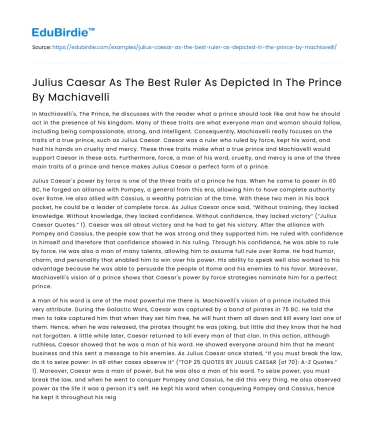In Machiavelli's, The Prince, he discusses with the reader what a prince should look like and how he should act in the presence of his kingdom. Many of these traits are what everyone man and woman should follow, including being compassionate, strong, and intelligent. Consequently, Machiavelli really focuses on the traits of a true prince, such as Julius Caesar. Caesar was a ruler who ruled by force, kept his word, and had his hands on cruelty and mercy. These three traits make what a true prince and Machiavelli would support Caesar in these acts. Furthermore, force, a man of his word, cruelty, and mercy is one of the three main traits of a prince and hence makes Julius Caesar a perfect form of a prince.
Julius Caesar's power by force is one of the three traits of a prince he has. When he came to power in 60 BC, he forged an alliance with Pompey, a general from this era, allowing him to have complete authority over Rome. He also allied with Cassius, a wealthy patrician of the time. With these two men in his back pocket, he could be a leader of complete force. As Julius Caesar once said, “Without training, they lacked knowledge. Without knowledge, they lacked confidence. Without confidence, they lacked victory” (“Julius Caesar Quotes.” 1). Caesar was all about victory and he had to get his victory. After the alliance with Pompey and Cassius, the people saw that he was strong and they supported him. He ruled with confidence in himself and therefore that confidence showed in his ruling. Through his confidence, he was able to rule by force. He was also a man of many talents, allowing him to assume full rule over Rome. He had humor, charm, and personality that enabled him to win over his power. His ability to speak well also worked to his advantage because he was able to persuade the people of Rome and his enemies to his favor. Moreover, Machiavelli's vision of a prince shows that Caesar's power by force strategies nominate him for a perfect prince.
Save your time!
We can take care of your essay
- Proper editing and formatting
- Free revision, title page, and bibliography
- Flexible prices and money-back guarantee
A man of his word is one of the most powerful me there is. Machiavelli's vision of a prince included this very attribute. During the Galactic Wars, Caesar was captured by a band of pirates in 75 BC. He told the men to take captured him that when they set him free, he will hunt them all down and kill every last one of them. Hence, when he was released, the pirates thought he was joking, but little did they know that he had not forgotten. A little while later, Caesar returned to kill every man of that clan. In this action, although ruthless, Caesar showed that he was a man of his word. He showed everyone around him that he meant business and this sent a message to his enemies. As Julius Caesar once stated, “If you must break the law, do it to seize power: in all other cases observe it” (“TOP 25 QUOTES BY JULIUS CAESAR (of 70): A-Z Quotes.” 1). Moreover, Caesar was a man of power, but he was also a man of his word. To seize power, you must break the law, and when he went to conquer Pompey and Cassius, he did this very thing. He also observed power as the life it was a person it’s self. He kept his word when conquering Pompey and Cassius, hence he kept it throughout his reign.
Since Caesar had a rule over his kingdom and was a man of his word, Machiavelli's vision of a prince shows that Caesar is a perfect man for the job.
In chapter 17 of The Prince, by Machiavelli, he advocates that a ruler should be Cruel and Merciful. He should have a sense of mercy, but not be taken away with being too merciful. Cruelty restores order and lets the prince be sure that in a state of conflict or war, that he will have the backs of the people and have an army to fight for him. When Caesar went to conquer Pompey in 48 BC, he left Rome with 20,000 soldiers. These men were war veterans and were skilled fighters under Caesar control. During the war, the encountered Pompey, who had 50,000 soldiers at his disposal. While they were outnumbered, they really had the advantage -- Caesar. Caesar was a cruel leader that would not accept defeat. They went into that battle and won, coming home victorious. It is important for a leader to have a nice side, but if they want to keep their kingdom in line, they have to approach with cruelty. Machiavelli stresses this importance in his book and would proudly look at Caesar as a prince. Although a prince should have so mercy in his playbook, cruelty shows the peasants of the kingdom who is in charge and evidently, leaves the prince with an army.
Consequently, Julius Caesar makes the perfect form of a prince showing that he has the traits of force, a man of his word, cruelty, and mercy -- the three main traits. When coming home from defeating Pompey, he showed force in his action and displayed he was in charge. After being captured by pirates, he told them that he would come back and kill them, and he did -- keeping his word. Lastly, When he went to conquer Pompey, he showed that strength is not just in numbers, hence showing his sense of cruelty over merciful. All of the things Caesar did in his career show that he is a version of the prince that Machiavelli who have supported. Hence, the traits to be a prince shown through Caesar's actions reveal his inner prince -- the perfect prince.






 Stuck on your essay?
Stuck on your essay?

